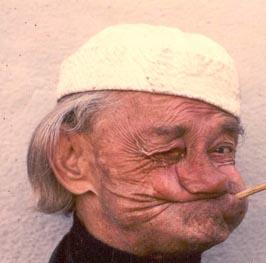 |
| Is it ugly to snitch pictures from the web? |
Beauty is not eternal, neither is it projected on a blank, neutral canvas by the mind of the visual, auditive or tactile beholder. It is an in-between: between the recognition of eternal abstract truths perfectly embodied in a work of art, and the unique creation of the one-time sublime by the conspiring individual minds of an artist and her admirer. Beauty is the entanglement of the spirit of abstract perfection and the spirit of the wondrous captivating singularity, one force in line with the universe, a total remembrance of the truth of being, the other force a violent forgetting and being overwhelmed by that which lays beyond our reach.
Pass on the salt, will you? We are painting here. Our topic is not an easy one, and many a philosopher has written large volumes on beauty, and greatly have they dissented. I trust a philosopher when I can agree with their aesthetic, and I think that is not unwise as our reflections on the beautiful are symptoms of the whole edifice of our thinking. But it is not beauty I am dealing with here. I felt the urge to write about ugliness, and more specifically about the ugly character.
What constitutes an ugly character? Let’s see if we can agree on this. An ugly character is arrogant, high-nosed, and doesn’t realize it. Ugly is egocentric, ignoring the needs of others that surround one. Ugly is greed and jealousy, lying and being short-tempered. The ugly character coincides partly with the traditional sinner, it is a bitter fatalist soul, possessed as it seems by some demon.
To learn about that demon, we can investigate how all the traits of ugliness are interrelated and form a cluster of ugliness that stains a mind.
I have a hypothesis that explains ugliness in terms that avoid cultural relativism. The premise is that every mind aspires to truth and beauty. What happens in the ugly character, according to this hypothesis, is that the in-between described above is distorted. The psychopathology of ugliness is what I call the sickness of wrong abstraction. The ugly abstracts and generalizes where a “normal” individual would be overwhelmed by singular beauty, and the ugly forgets everything in moments where that “normal” mind would gracefully generalize and be fulfilled with an enthralling sense of beauty. Thus, the ugly character is out of tune with the culture they live in because their existential quest has been annihilated by their society.
The ugly character’s quest for beauty is grossly distorted and that aberration results in a disconnection with the consensually beautiful. The faculties to perceive beauty the way “normals” do have vanished from the ugly mind. This aberration is the root of all the ugliness, the greed, the lying, the selfishness, the cynicism, the yelling, the betraying, the murdering. It is essentially abstraction gone wrong that can make people ugly.
A corollary is that in contemplating beauty – together – beautiful characters could thrive.